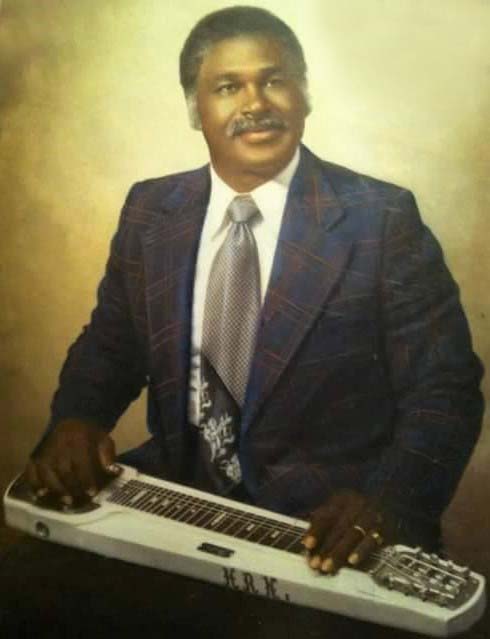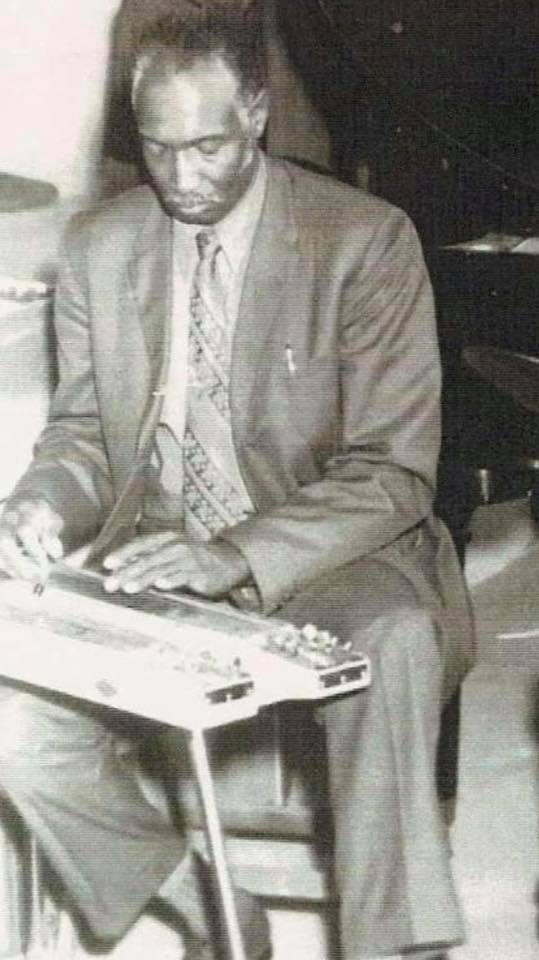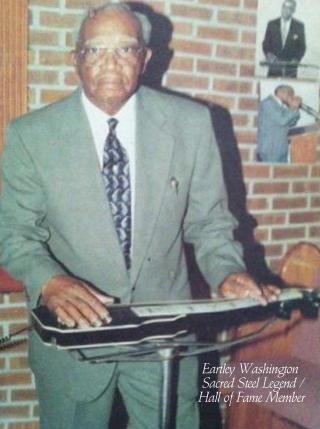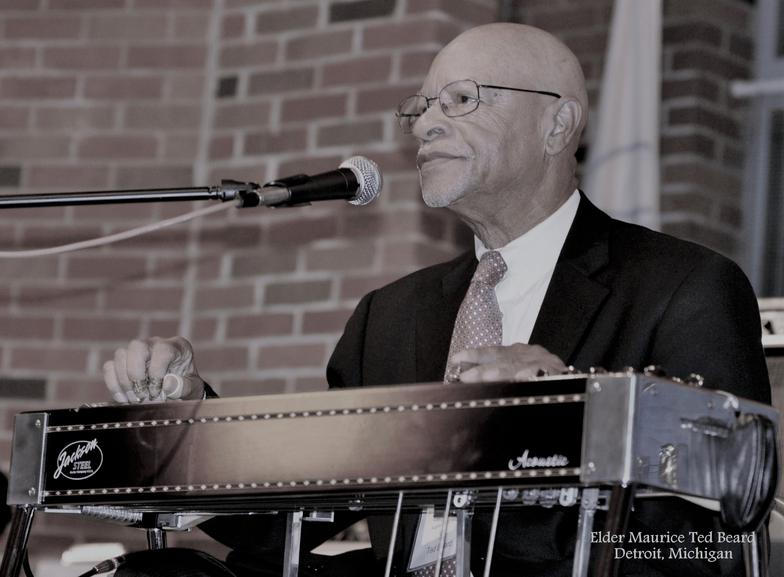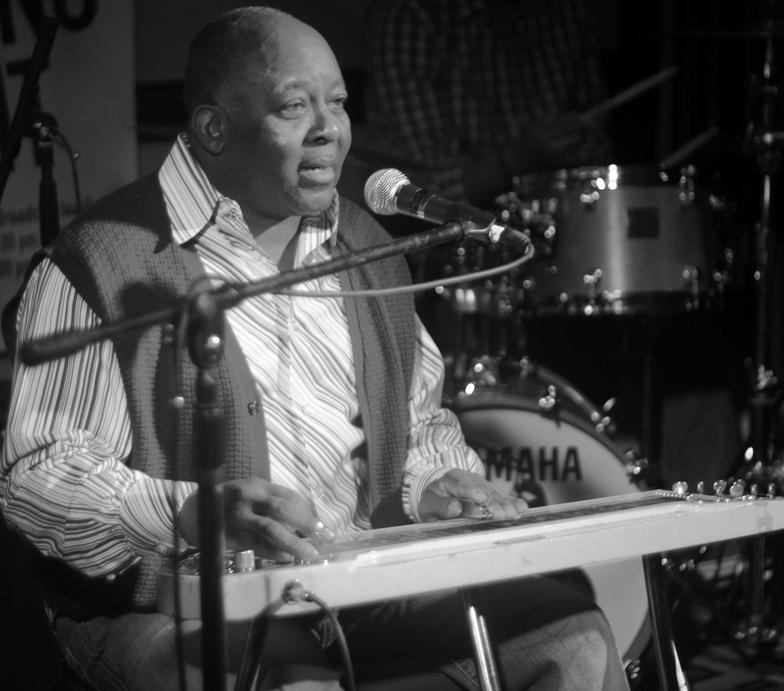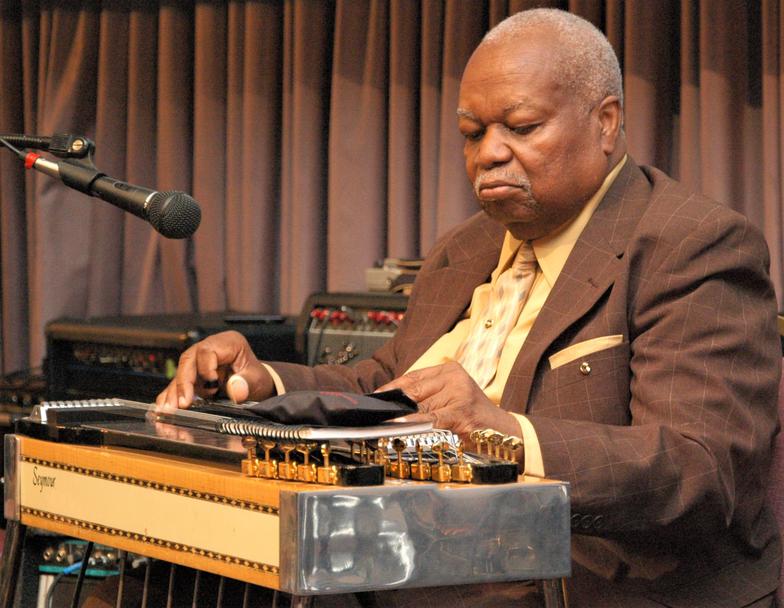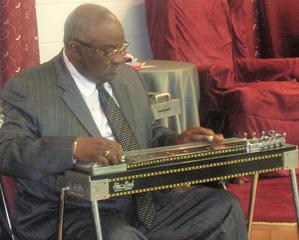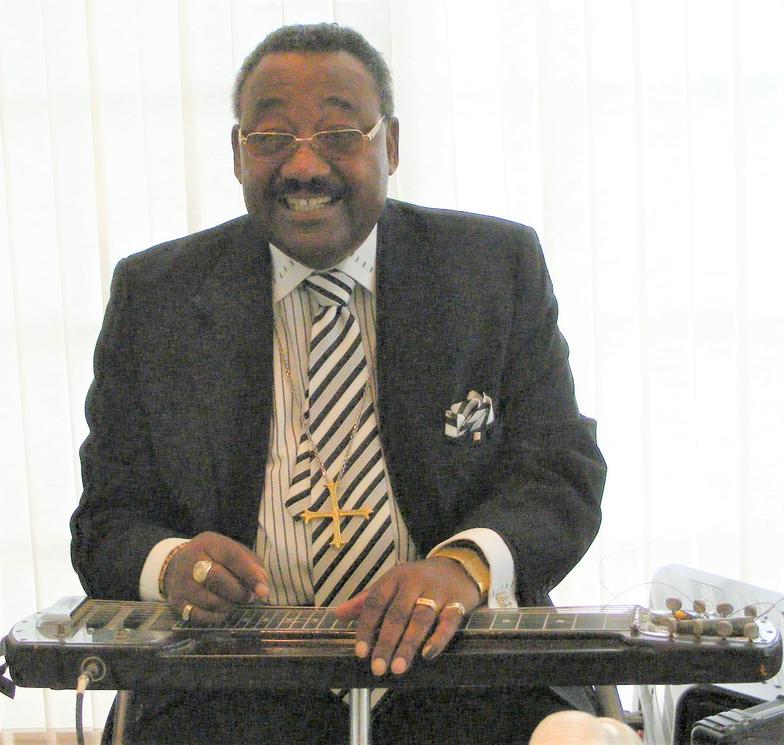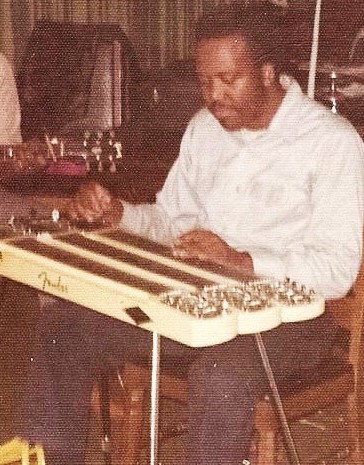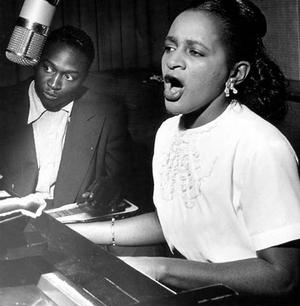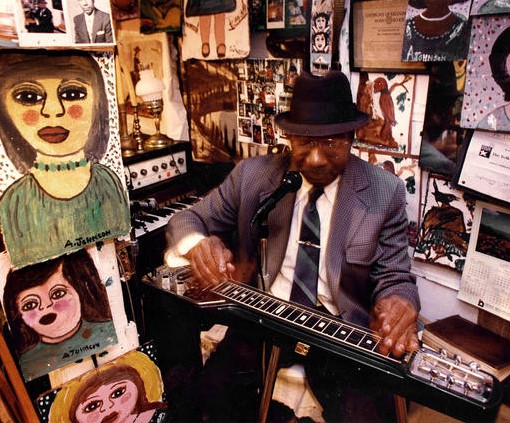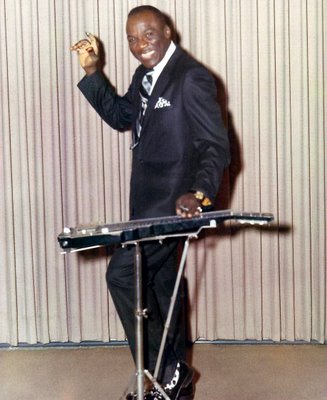Sacred Strings Records Inc.
Double click here to add text.
Double click here to add text.
Pioneers of The Steel Guitar Tradition
Willie Claude Eason (1921 -2005)
"The father of Sacred Steel Music".
Willie was the tenth child born to Henry and Addie Eason. Willie’s elder brother Troman taught him to read music at the urging of their Mother. He was known as “Little Willie and his talking guitar” because he developed his own style, playing single notes as he mimicked the African American singing voice.
Willie became a consummate performer and church musician playing a tremendous role in the formative years of the Keith dominion steel guitar tradition. He is responsible for placing the steel guitar in a position of central importance in Keith dominion church worship services.
Willie also traveled with the Gospel Feast Party at the request of Bishop J.R. Lockley. Eason was multi- talented playing steel guitar and the piano. Eason was a great businessman, landlord, booking agent, and gospel concert promoter. Willie made seven 78 –rpm records; four on the Queen record label, two for Aladdin, and one on the Regent record label. He recorded with the Soul Stirrers Quartet group, and the Gospel Trumpeters. He was inducted into the Sacred Steel Hall of Fame in 2011. Willie died of pneumonia in St. Petersburg, Florida on June 16, 2005.
Henry Randolph Nelson (1930-2001)
Henry was born in Ocala, Florida January 10, 1930. Henry’s first encounter with sacred steel guitar music was through Willie Eason, who later became Henry’s brother-in-law. Henry learned Willie’s style and began to add his own touch to it. His praise music became the foundation of what is considered by many to be true House of God praise music. Henry’s up- tempo, driving one chord style is what aroused the church congregations to a state of spiritual ecstasy.
Henry enjoyed singing “Just a closer walk with thee” as he played his steel guitar while dazzling his audience in the process. He shared the stage with several gospel greats such as Rosetta Tharpe. Henry also played steel behind the legendary gospel great Mahalia Jackson, in New York at the Columbia recording studio. The song was titled “To me it’s so wonderful. Henry was inducted into the Sacred Steel Hall of Fame in 2011. Henry Randolph Nelson passed away April 8, 2001.
Lorenzo Leonardo Harrison (1925-1986)
Lorenzo was born in Ocala, Florida, February 11, 1925, to Frank and Henrieta Harrison. He was the chief musician of the Jewell Dominion church for over forty years. His desire as a young man was to use his talent playing music for the Lord, while traveling with the Overseer, Bishop M.L. Jewell.
Lorenzo was influenced early in his music career by Willie Eason, Henry Nelson, and Fred Neal, just to name a few. He played his sacred steel guitar better known as Lorenzo’s Harp, with the skill of a surgeon often redefining what could be played on the instrument.
Using the Morley Wah Pedal, he created a sound and style of music never before heard in churches and changed the way most people perceived the steel guitar. People came from miles around to hear him play. Lorenzo traveled and recorded on the Nashboro Record label with the Jewell Gospel Trio playing the bass fiddle and steel guitar. He was inducted into the Sacred Steel Hall of Fame in 2010.
Bishop Lorenzo L. Harrison passed away in Indianapolis, Indiana December 26, 1986 and will be remembered as one of the greatest steel guitarist to ever grace the music world.
Fred L. Neal (1922-1991)
Fred Neal is on record as one of the earliest sacred steel players to travel with Bishop Mattie Lou Jewell, also known as Chief, in the early years of her church administration. Fred was born April 3, 1922 and in 1939 at the age of 17 years old, Chief Jewell heard Fred play in Corinth, Mississippi and was very impressed.
Mora Neal, Fred’s mother, allowed her son to join the church band and travel with Chief as she established new churches across the United States. Fred traveled and played the steel guitar for the church from 1939 to 1953, after which he relocated to Los Angeles, California.
People would come to the Los Angeles church just to hear him play. The spirit of God moved through the church as he played skillfully. He would even get happy himself while playing and would holler out!! Fred was inducted into the 2010 Sacred Steel Hall of Fame in Toledo, Ohio.
Eartley Washington (1926-2004)
Eartley Washington, respectfully known as “D’ Music Man”, was born October 6, 1926 in Eutawville, South Carolina. He married the Late Angiereen Davis-Washington in 1946. To this union seven children were born, five boys and two girls.
In his early 1920’s, he received the heavenly gift of playing many musical instruments for the glory of God. The instruments he played were the Steel Guitar, harmonica, organ and piano.
Eartley played for his church, The House of God Church, Inc. Keith Dominion and other community churches on programs and groups throughout his lifetime. On December 28, 2013, his music legacy was honored during the Washington family music reunion in South Carolina.
Eartley passed away in 2004, after playing the steel guitar for 53 years, but not before passing his musical gifts on to his children and grandchildren. In 2014, Eartley Washington was inducted into the Sacred Steel Hall of Fame in Toledo, Ohio.
Maurice Ted Beard Jr.
Ted Beard, born June 15, 1935, to Maurice Sr., and Fannie Mae (Asberry) Beard. Ted began his music career as a member of the Jewell Dominion Church of the Living God, where he played the steel guitar with his brothers Douglas and Billy Beard in Detroit, Michigan.
The Beard family later joined the Keith Dominion House of God Church, where Ted became the Chief Musician and National Music Coordinator. He is highly respected as one of the leading practitioners and innovators of the Sacred Steel music tradition.
Elder Maurice Ted Beard was ordained pastor of the Joy Road House of God Church in Detroit, Michigan in 1987. Ted has an audio CD playing many of his signature songs, hymnals, and church tunes. He has also produced an instructional video teaching the basics of Sacred Steel music.
Elder Maurice Ted Beard laid the foundation and set the standard by which many steel players are measured in the Keith Dominion Church. Maurice Ted Beard received the Legends Award in 2009, he was inducted into Sacred Steel Hall of Fame in 2010, and later received the Sacred Steel Lifetime Achievement Award in 2018.
Bishop Ronnie P. Hall
Ronnie P. Hall was born and raised in Detroit, Michigan to Deacon Phillip and Elder Ruby Hall. He’s a multi- talented musician playing both the steel, rhythm, and bass guitars fluently. He became interested in playing music around age eight or nine, but it wasn’t until 1953 that Ronnie began playing consistently for the Ecorse, Michigan Church of the Living God, Jewell Dominion.
In 1973, Ronnie bought his first Fender eight-string steel guitar.
He favors this steel guitar over others in his vast collection of string instruments. His early influences were Teacher Felton Williams Jr.
and Bishop Lorenzo Harrison.
Bishop Ronnie P. Hall is currently the senior Pastor of the Mt. Carmel Full Gospel Assemblies Inc. He established Golden Sacred Strings Inc., to preserve his body of work to someday be remembered in the history books of African American steel guitar players. Ronnie was presented with the Legends Award in 2009, he was inducted into the Sacred Steel Hall of Fame in 2010, and received the Life Time Achievement Award in 2018.
Calvin Cooke
Calvin is an innovative master of sacred steel music. He was born January 11, 1944 in Cleveland, Ohio to a family that belonged to the Jewell Dominion Church of the Living God. This is where he got his start as a steel guitar player at the age of eleven.
Calvin later joined the Keith Dominion House of God Church, by the age of fifteen developed into a very gifted and anointed steel player and vocalist, touching the lives of many as he traveled the world playing in the name of Jesus.
He has performed at such venues as the Kennedy Center, the Concert of Colors and numerous other festivals thru-out the United States, Canada, and Europe.
Calvin is one of the most influential and decorated sacred steel players of his era, receiving the Michigan Heritage Award, Detroit Music Award, 2009 Sacred Steel Legends Award. Calvin Cooke was inducted into the 2010 Sacred Steel Hall of Fame in Toledo, Ohio.
Felton W. Williams Jr. (1934-2012)
Felton Washington Williams Jr. was born January 3, 1934 to Felton Washington Williams Sr. and Katie Ware Williams in Tupelo, Ms. Felton attended Henry Ford College in Dearborn, Michigan where he earned his journeyman electrician’s license.
Felton was a member of the Jewell Dominion Church of the living God, a Holiness – Pentecostal church where he learned to play the Hawaiian lap steel and Spanish guitar in the mid 1940’s.
In 1969, Felton built his own custom recording studio in the basement of his home and soon after began recording artist under the Revival record label. During the 2009 Sacred Strings Showcase concert in Toledo, Ohio, Felton was presented with the Legend Award. In 2010, he was inducted into the Sacred Strings Hall of Fame.
In 2013, Felton donated his first handmade double neck console lap steel guitar to the Smithsonian National Museum of African American History and Culture; located in Washington D.C. Felton Washington Williams Jr. passed away in his home March 11, 2012 and was laid to rest in the Detroit Memorial Park West Cemetery.
Troman Eason (1905-1949)
Troman Eason of Philadelphia, PA, is widely acknowledged as the first musician to introduce the electric Hawaiian guitar into the House of God Church in the 1930’s. As he traveled with Bishop J.R. Lockley and his Gospel Feast Party ministry, the instrument caught the attention of other aspiring musicians throughout the organization producing countless tradition bearers over the years.
Henry Wayne White (1944- 2012)
Wayne White Born to Son Henry White and Mary Jane Hartwell of Detroit, Michigan. Wayne White is a master of this steel guitar tradition and actually played rhythm guitar years before even considering the steel guitar. Around 1957 or 1958, Sonny Treadway (another steel guitar master) taught Wayne rhythm guitar so they could play together in the local church services.
In 1965 while dating his future wife, Drucilla (Warren) White a Toledo, Ohio native, Wayne was encouraged to learn the steel by Clifford (Buddy) Warren. After taking a serious interest in the steel, Wayne began to follow in the footsteps of Felton Williams Jr., and Lorenzo Harrison. Wayne’s youthful style of playing inspired other young steel players in the Michigan and Ohio church districts to continue on the tradition. Henry Wayne White was inducted into the Sacred Steel Hall of Fame in 2010.
e to add text.
James Rusher Sherman (1936-2023)
James R. Sherman began playing the steel guitar in the mid 1950’s at the age of fifteen years old. James took steel guitar lessons for a short time and learned to read sheet music. He learned to play the sacred steel style under the tutelage of Felton W. Williams Jr., Lorenzo L. Harrison, Calvin Shaw and many others.
James later joined the Church of the Living God Band #2, where his mother, Elder Luzenia Sherman was pastor. It was here that James began to advance as a steel guitar player. Parents are the late Elder Rusher and Elder Luzenia Sherman. James married Ella Cummings Sherman, and together they have three wonderful children. He is currently Bishop over Trinity Central West Diocese. James Rusher Sherman was inducted into the Sacred Steel Hall of Fame in 2010.
Aubrey Ghent Sr.
Aubrey Ghent born October 17, 1958, to the union of Henry Nelson and Hattie Ghent Nelson. On July 31, 1993, he married Lori Colley. Aubrey has been playing the lap steel guitar for over 40 years. He is a true legend and master artist in his own right.
In 1994, Ghent performed at the Smithsonian Folk Masters Concert at the Barns of Wolf Trap in Vienna, VA where his music was recorded and placed in the Institute's archives. Later that year he was named and awarded Master Artist of the state of Florida. He gained national attention by being placed in the rotation on National Public Radio on numerous occasions.
Through all of the exposure, Arhoolie Records became interested and began recording footage of Ghent during church services. He signed a contract with Arhoolie in 1996, with his group "Aubrey Ghent & Friends," and released their first solo CD entitled "Can't nobody do me like Jesus." The record was a huge success and continues to be in high demand.
Aubrey Ghent was inducted into the Sacred Steel Hall of Fame August 9, 2014, in Toledo, Ohio.
Charles Edward Flenory (1948- 2017)
Charles Flenory was born March 18, 1948, in Cleveland OH. He was born to Bishop George and Mary Flenory. Charles is the proud father of three children. He began playing the lead guitar at the age of 5 years old and steel guitar at the age of 13. He played at the House of God Church in Cleveland Ohio. In 1986 he moved to Detroit MI where he played with the Legendary Bishop Ronnie P. Hall for over 30 years.
His greatest influences were Hall of Fame Members Calvin Cooke and Ronnie Hall. He was an assembly musician at the House of God in Nashville, TN. Charles Flenory is a songwriter and music arranger. He is well known for writing the Campbell Brothers hit song entitled “Jump for Joy” and played guitar on some of the tracks.
He was inspired by Hall of Member Felton W. Williams Jr. to learn sound recording. Charles, a 1977 graduate of the Recording Institute of Detroit Recording Engineering Program. Charles Flenory, Owner of Gospel Sound, received a Billboard Platinum award for the design and construction of the Platinum Sound Studios facilities in Atlanta, Georgia several years ago.
In 2004 Charles received the Special Motown Achievement Award presented by Bob Dennis. Charles E. Flenory was inducted into the Sacred Steel Hall of Fame in 2014.
James Rudolph Golden (1937-1993)
James Golden, affectionately known as “Tubby,” was born in Warren Ohio on December 22,1937 to James and Dallas “Dixon” Golden. Tubby was trained under the tutelage of Sacred Steel Legend, Lorenzo L. Harrison, and became one of the Sacred Steel masters of his era.
Tubby created his own signature sound and was one of the few pedal steel guitarists in the Jewell Dominion church. He began to experiment with other styles and tunings thus developing his own technique.
In 1971, Tubby recorded with the Golden Brothers on the Pacific Records Label, producing two sides entitled, “I Believe and Little David.” He was also a member of the New Revelation Band which recorded with Reverend Mackalee Washburn on his “Spreading the Gospel Album.”
James Tubby Golden passed away in 1993 and his contribution to this music tradition has given him a seat alongside many distinguished African American steel guitar players. Tubby received the Sacred Steel Legends Award in 2009, in 2010 he was inducted into the Sacred Steel Hall of Fame.
Charles “Chuck” T. Campbell
Chuck began playing in the church at age eleven and today is recognized as a great innovator and teacher of the tradition. In the 1970’s he began playing the twelve-string pedal steel guitar. Campbell developed a unique tuning and set-up for the pedal steel that is emulated by a new generation of steel players.
Chuck is one of three steel players in the Slide Brothers ensemble, a group of sacred steel players founded by steel guitar virtuoso, Robert Randolph.
Homespun Music Instruction 2004 – Homespun produced a 90-minute instructional video of Chuck Campbell teaching in close-up detail, the techniques and musical ideas of sacred steel music using the pedal steel guitar.
Heritage Fellowship Award
In 2004 the National Endowment for the art presented Chuck Campbell with the Heritage Fellowship Award. The NEA recognizes lifetime achievement, artistic excellence and contributions to our nation's traditional arts heritage. In addition to being a master of the art form, Campbell serves as a role model for dozens of aspiring steel players within the House of God church and abroad. Chuck Campbell was inducted into the Sacred Steel Hall of Fame in 2018.
Double click here to add text.
Double click here to add text.
Double click here to add text.
Double click here to add text.
Sam Windham (1932-1977)
Elder Sam Windham was born in Heidelberg, Mississippi, on January 3, 1932, and migrated with his family to Charleston, South Carolina, at the age of eleven because of his mother's work during the war. Eventually, in 1943, he came to New York City, where he learned how to play the Hawaiian Guitar. Sam was called to the ministry of the gospel in 1956.
Sam was the former Hawaiian steel guitarist for the famous Clara Ward and the Ward Singers of Philadelphia, Pennsylvania. He played several steel guitar parts on the Gotham and Savoy recordings. He also accompanied the Angelic Choir on a number of their early recordings.
He was later ordained an Elder in the Church of God in Christ in 1958. He was the pastor of Samuel's Temple Church of God in Christ, Inc. which is located at 75 East 125th Street. Sam recorded a live album with W&W Records entitled “A Vison of Heaven.”
Elder Anderson Johnson (1915 - 1998)
Anderson Johnson was born August 1, 1915, 70 miles outside of Richmond, Virginia, out in the country on the farm. His parents were Richard & Lucy Wilson Johnson who were blessed with six children to this union, three other boys and two girls.
Anderson was drawn to music at the age of six after seeing his mother’s friend playing a guitar. Young Anderson Johnson began preaching after he was hit by lightning during a terrible thunderstorm in a cornfield in Lunenburg, Virginia. He became a child prodigy, and as early as age twelve, he pastored a church in Vineland, New Jersey.
Johnson started preaching at the age of eight, he earned enough money to buy his first guitar while working at a barbershop and traveled all over the country for some 40 years doing so. At age 19, he saw the U.S.A. in a beat-up Chevy; and in 1952, Johnson was singing gospel on a street corner in Miami when Henry Stone walked by and offered him a record deal.
He made a fine record of “God Don’t Like It” and others back in the 1958 in Miami, Florida, for the Angel, Glory and Delu Anderson Johnson was born August 1, 1915, 70 miles outside of Richmond, Virginia, out in the country on the farm. His parents were Richard & Lucy Wilson Johnson who were blessed with six children to this union, three other boys and two girls. Anderson was drawn to music at the age of six after seeing his mother’s friend playing a guitar. Young Anderson Johnson began preaching after he was hit by lightning during a terrible thunderstorm in a cornfield in Lunenburg, Virginia.
He became a child prodigy, and as early as age twelve, he pastored a church in Vineland, New Jersey. Johnson started preaching at the age of eight, he earned enough money to buy his first guitar while working at a barbershop and traveled all over the country for some 40 years doing so. At age 19, he saw the U.S.A. in a beat-up Chevy; and in 1952, Johnson was singing gospel on a street corner in Miami when Henry Stone walked by and offered him a record deal. He made a fine record of “God Don’t Like It” and others back in the 1958 in Miami, Florida, for the Angel, Glory and Deluxe labels.
He eventually settled in Newport News, Virginia where he built his church and became a respected outsider artist. His paintings were mainly of women’s faces. He loved to play his steel guitar and sing but was also a fine pianist and drummer. Elder Anderson Johnson spent his career preaching and playing his steel guitar on the streets of America.
Lonnie Farris (1924-1988)
Lonnie Farris was born June 1924 in Charlotte, North Carolina. He was a very charismatic and entertaining steel guitar performer. The dynamic Hawaiian guitar of Reverend Lonnie Farris should be proof enough of the resilience and adaptability of modern gospel music. Lonnie Farris released 16 songs under his own name between 1962 and 1964.
His recordings are incredibly eclectic and draw from all sorts of musical influences. Within this body of work, you’ll find booting saxophone solos, syncopated washboard percussion, and soulful vocalists.
The one element holding all of these recordings together is Farris’ accomplished Hawaiian steel guitar. He plays with an ease and freedom that is sometimes smooth as silk and sometimes bold and fiery.
Lonnie Farris was robbed and murdered November 24, 1988, in Los Angeles, California, at the age of 64. He was laid to rest at the Rose Hill Memorial Park in Whittier, California.

